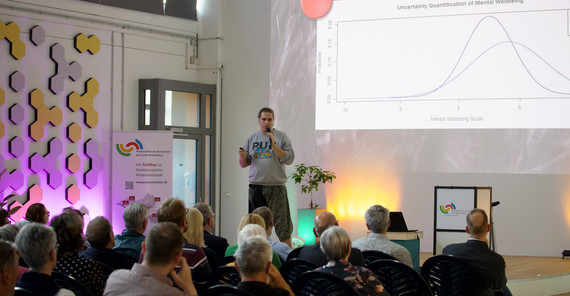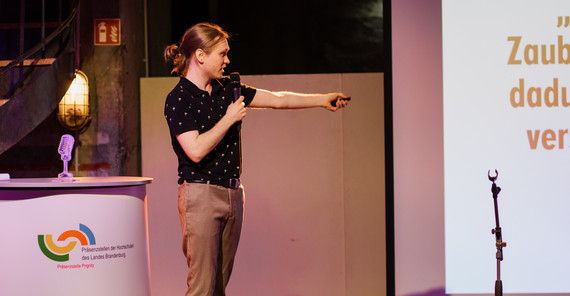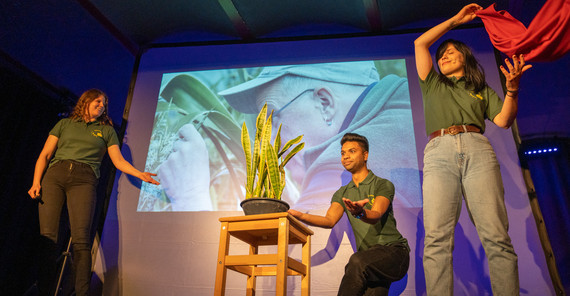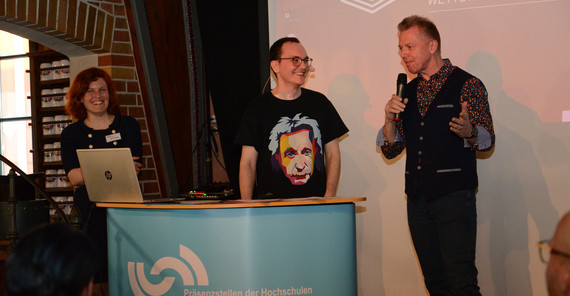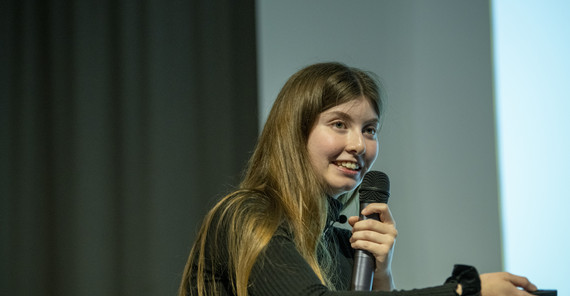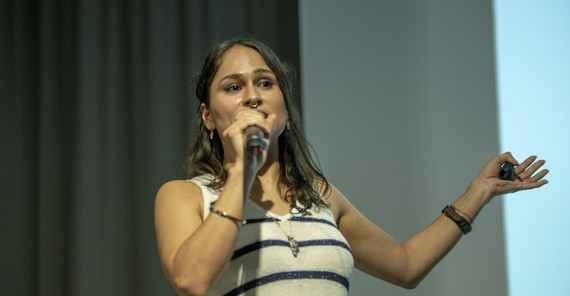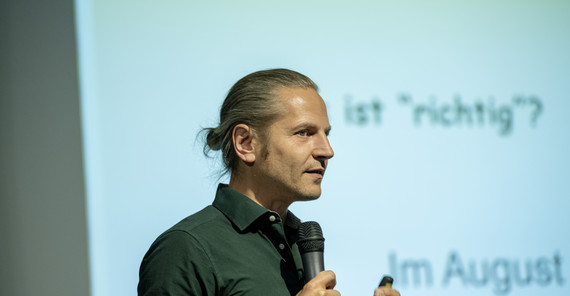Hans Reimann, a Master's student teacher of maths and English, has been working on a fascinating question: How can ideas, approaches and methods in maths help to better understand the mental health and satisfaction of pupils? He has been working intensively on this topic with the aim of using targeted support programmes in the classroom. For Hans, the Science Slam is a unique opportunity to make his research findings accessible to a wide audience and at the same time consciously leave his own specialist bubble. He emphasises: "The Science Slam challenges me to recognise the essence of my idea and to present it in a way that is understandable and appealing beyond the discipline." For Hans, taking to the stage in Luckenwalde is a courageous step out of his comfort zone.
Julian Stähle, a Master's student on the Astrophysics programme, is dedicated to researching Wolf-Rayet stars in order to learn more about the past of the universe and better understand our existence. A fascinating fun fact: we are all made of stardust. Julian decided to take part in the Brandenburg Science Slam in particular to improve his presentation skills in his studies and to present his research in a simple and understandable way. He recognises the added value of this experience for his own understanding of his research: "I realise that it also helps me a lot to better understand my own research." Although it was initially unfamiliar and exciting for Julian to stand in front of an audience that is not necessarily familiar with his specialism, he really enjoyed his appearance on stage in Finsterwalde. He emphasises: "A relaxed yet sophisticated approach to any subject makes it much easier to get enthusiastic about a specialist area, understand it and communicate it to other people." He takes this learning in knowledge transfer with him as a valuable insight.
Thoralf Dietrich, a doctoral student at the Institute of Geosciences, is working on the seismic analysis of glacier floods in Iceland with the aim of increasing the warning time for surrounding towns and villages and initiating timely evacuation measures downstream. For Thoralf, the Brandenburg Science Slam was a special opportunity: "I was actually able to bring my scientific work to where my grandparents' generation lives - the Brandenburg countryside. It was a welcome change from the student bubble I normally find myself in at Golm. It gave me the opportunity to answer questions in person to people who might otherwise only have had access to my topics via television or the internet. There were people of all ages, from little girls to pensioners." His fascination with the science slam format lies above all in the interaction with the audience: "There is so much work and courage in the presentations, but often the audience is not gracious to those standing in front of them. But at least they talk to each other! Because a science slam can actually impart a lot of knowledge to an open-minded audience in a short space of time. It's fascinating - the slammers manage to break down their work into small, understandable morsels for a non-specialist audience. This creates the basis for people to start asking questions and communicating with each other. A simple "What did you think of the presentation?" then becomes "Did you understand the topic? Can you explain it to me briefly?".
Last but not least, Corvin Drößler, a Master's student teaching geography and German. His research focuses on the topic of Critical Westdeutschness, which deals with the persistent differences between East and West Germany. For Corvin, what makes the Brandenburg Science Slam special is the fact that it takes place in unusual places that are not normally associated with science. He emphasises: "What is special about the Brandenburg Science Slam is that it leaves the university/university locations and the popular science lectures take place in places that are not usually associated with research (e.g. pubs). It allows you to leave your own filter bubble and even in the periphery of Brandenburg, science can be perceived as being closer to people than an academic ivory tower." Corvin learnt valuable lessons from his participation in the Science Slam: "I can well imagine using strategies from the Science Slam in my future teaching to make knowledge communication exciting, educational and fun. Memes always work and can also be used well in knowledge transfer. It was also a small challenge to prepare a rather complex scientific topic in such a way that it can be understood at a low level without prior knowledge - in 10 minutes. It is generally essential for knowledge transfer that research can be understood by everyone without prior knowledge and not just within the research community."
Finally, we would like to thank all the slammers from the University of Potsdam who took part in the Brandenburg Science Slam: Anita Henze, Susanne Kohrs, Dr Hans-Georg Müller, Alina Weber, Tahmid Tusar, Sarah Leonhardt and Dr Peter Ulrich. With their fascinating presentations, they have helped to bring the world of Brandenburg science closer to a wide audience in Finsterwalde, Fürstenwalde, Luckenwalde, Neuruppin, Schwedt and Velten. Your commitment and enthusiasm have played a key role in the success of the Science Slam. Thank you for your participation!
The application deadline for participation in the 3rd Brandenburg Science Slam ends on 31.01.2024. Apply now to Maria Korn-Götze (maria.korn-goetzeuuni-potsdampde).

